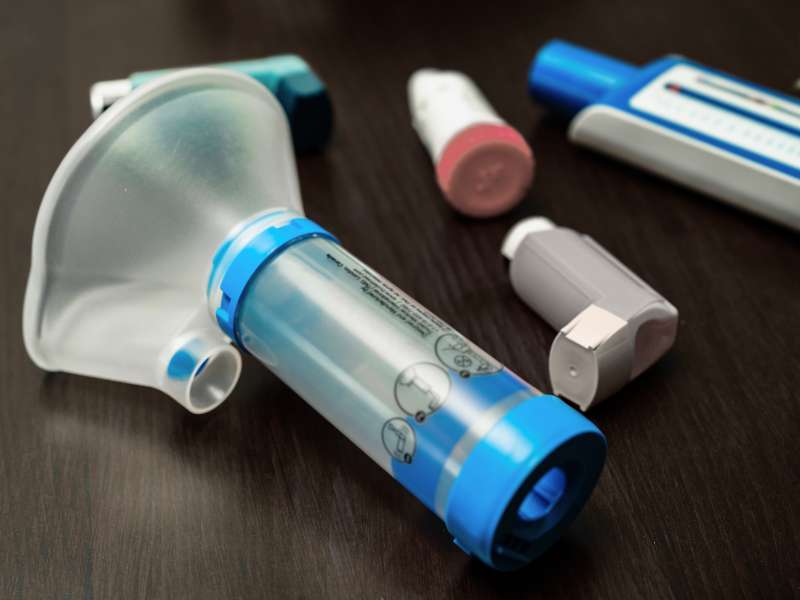Asthma clinic innovates with video-based education to improve patient outcomes
June 18, 2024

Asthma, a chronic respiratory condition, affects an estimated 25 million people in the U.S. according to the Centers for Disease Control.
In 2023, the Asthma and Allergy Foundation of America ranked Richmond, Virginia as the No. 7 asthma capital, identifying it as a city with higher-than-average asthma-related deaths and emergency department visits. The report also noted that Richmond had the second-highest asthma mortality score among the cities analyzed. Contributing factors include environmental conditions, air quality issues, pollen levels and other triggers that exacerbate asthma prevalence and severity.
Addressing a critical need in Richmond
Motivated by the challenges faced by newly diagnosed asthma patients, the team at the Asthma Clinic at VCU Health has launched an innovative video-based educational tool to improve patient health literacy and symptom self-management.
Stephanie Bork, M.S.N., APRN, FNP-BC, a clinical instructor at the VCU School of Nursing and member of the school’s faculty practice who holds an appointment in the clinic, is a member of the team that produced the new tool. In her faculty practice role, she combines her expertise treating patients with her teaching duties to improve how patients are cared for and educated.
Bork explained that the success of treatment protocols is largely dependent on successful patient education. "Asthma management is heavily reliant on patients' understanding of their condition and the correct use of medications,” she said. “However, time constraints during clinic visits often limit the amount of education providers can offer."
To address this known gap, the team is testing the effectiveness of pre-recorded videos that deliver information and education on asthma. Patients and their families watch the videos on tablets during their clinic visits to learn more about their disease and proper medication use.
"Patient education is an integral part of asthma management, and this empowers patients to have a better control on their disease. We aim to increase patients' understanding of their medical condition through this project” said Farrukh Abbas, M.D., who collaborated with Bork on the initiative. “Stephanie Bork is playing a key leadership role in this project and other initiatives at the VCU Health Asthma Clinic."
Addressing asthma management challenges and disparities
 Stephanie Bork, M.S.N., APRN, FNP-BC
Stephanie Bork, M.S.N., APRN, FNP-BCAsthma patients and their families encounter several challenges in managing an asthma diagnosis effectively. Key among these is understanding the importance of proper medication use and recognizing worsening symptoms.
"Inhalers, the cornerstone of asthma therapy, are often expensive and vary widely in their usage instructions. Ensuring patients can afford and correctly use their inhalers is crucial," Bork explained.
Many patients lack an asthma action plan, which is essential for managing flare-ups. The new patient education tool addresses this challenge head-on. The first set of videos covers essential topics like asthma basics, inhaler techniques, asthma action planning and identifying triggers.
“Our hope is that these videos will empower patients with a greater understanding of their disease, leading to better self-management and fewer asthma flare-ups," Bork said.
This project also aims to reduce disparities in asthma care. According to the latest disparities update from the Virginia Department of Health, Black residents are disproportionately affected by asthma, with higher rates of asthma-related hospitalizations and mortality.
“There is a large disparity here for patients with asthma. We are hoping to decrease that disparity by improving access to care and education for patients,” Bork explained.
Expanding asthma education beyond the clinic
The Asthma Clinic, which is known for its specialized care of severe and difficult-to-treat asthma cases, extends its commitment to comprehensive patient care with the introduction of the new video-based learning tool.
Our hope is that these videos will empower patients with a greater understanding of their disease, leading to better self-management and fewer asthma flare-ups.
Stephanie Bork, M.S.N., APRN, FNP-BC
Pending evaluations of how the videos are performing, the team plans to extend their use beyond the walls of the clinic. "If the pilot is successful, we hope to expand the use to other providers in pulmonology outpatient clinics and eventually possibly inpatient settings," Bork said.
By incorporating these educational videos into routine care, there is potential to significantly enhance patient outcomes and reduce healthcare disparities associated with asthma management. This initiative not only establishes a precedent for future advancements in asthma education but also underscores the clinic's unwavering dedication to improving patient outcomes through innovative healthcare solutions.